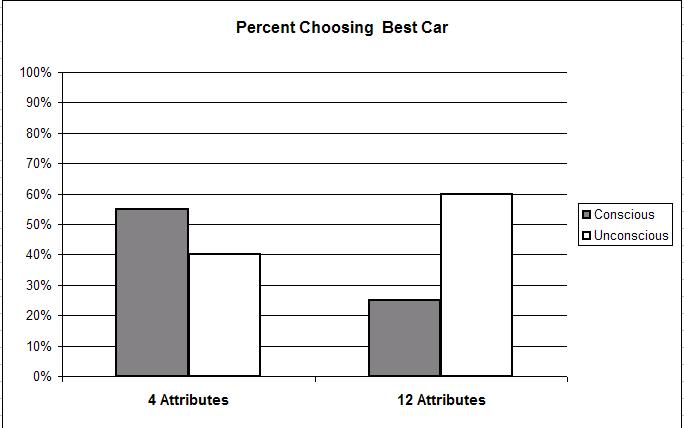On Making the Right Choice: The Deliberation-Without-Attention Effect
Citation: Ap Dijksterhuis, Maarten Bos, Loran Nordgren, Rick van Baaren (2006) On Making the Right Choice: The Deliberation-Without-Attention Effect. Science (Volume 311(5763)) (RSS)
DOI (original publisher): 10.1126/science.1121629
Semantic Scholar (metadata): 10.1126/science.1121629
Sci-Hub (fulltext): 10.1126/science.1121629
Internet Archive Scholar (search for fulltext): On Making the Right Choice: The Deliberation-Without-Attention Effect
Download: http://www.sciencemag.org.ezp-prod1.hul.harvard.edu/cgi/content/abstract/311/5763/1005
Tagged: Psychology
(RSS) unconcious thought (RSS), decision making (RSS)
Summary
Remember the old wisdom of making a list with positives and negatives, consciously weighing them against each other, and then making a decision? It turns out this might not be such a great strategy in all types of decisions. The counter strategy of "just sleep on it" might actually be better under certain circumstances.
This paper highlights the value of unconscious decision making. The authors suggest that in simple decisions tasks with few attributes (such as deciding about a new pair of gloves), conscious decision-making is actually pretty good. However, in complex decisions-making tasks with many attributes, such as deciding between two houses, unconscious decision making works better.
Conscious decision making is good when you want to be precise, such as when you do math problems. However, conscious decision making is not good with complexity. Unconscious decision-making, on the other hand, isn't so precise but is good with complexity.
This paper highlights four studies where they they demonstrate these effects. In the first study participants either read about four hypothetical cars each with 4 attributes (simple) or 12 attributes (complex). In both groups (simple vs. complex) one of the cars was objectively better than the other three, having more positive attributes. Participants were asked to choose which of the four cars was best. Participants were further divided into groups where they either consciously thought about the cars for four minutes, or unconsciously thought about the cars. In the conscious group, participants actively thought about which car was the best for four minutes. In the unconscious group, participants were distracted for four minutes solving unrelated puzzles, and then decided which car was best.
Results were as expected. When participants were considering the simple cars with only four attributes, the conscious thinkers were better at choosing the best car. However, when participants were considering the complex car with 12 attributes, the unconscious thinkers were better at choosing the best car.
The authors further demonstrate evidence of this effect in the world where people are happier with their purchases for complex products (like furniture) when they appear to be unconsciously thinking about it, and are happier with their purchases for simple products (like clothing) when they are consciously thinking about it.x
Theoretical and Practical Relevance
A lot of decision-making research has focused on conscious rational decision-making, and reflective judgments to be more optimal. However, this research suggests the old saying of "sleep on it" or "put it on the back burner" might be better under certain conditions. This has great implications for everyday decision-making. In some cases, we should just put away the spreadsheets.
